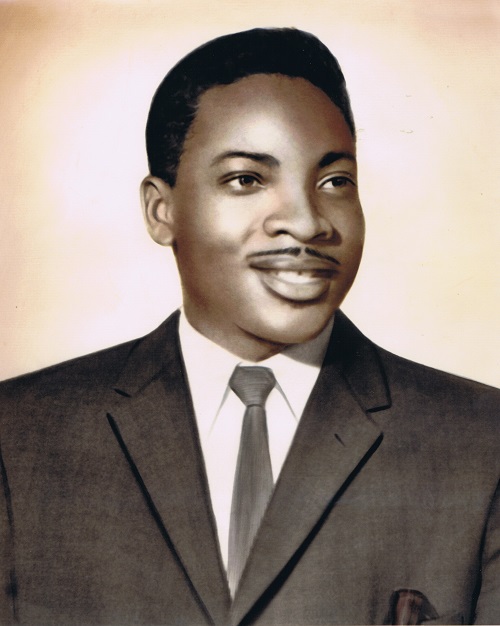
McCartha Linda Sandy-Lewis, better known as Calypso Rose_The greatest of the female Calypsonians, and still going strong in her 70s…
.
Through great ex-tempo performers, singers, composers and arrangers, Calypso music has been evolving for more than a century. The Roaring Lion, Lord Invader, Lord Pretender, Lord Kitchener, Calypso Rose, Lord/Ras Shorty, David Rudder – the list could go on and on; so many have been innovators or have deepened the tradition. Political, social and sexual commentary, as well as a healthy joie-de-vivre for fête-ing, have all characterized Calypso. The music has branched out into Chutney Soca via Indian pioneers such as Drupatee Ramgoonai; has voyaged through temporary influences from Ragga and Dancehall; has even fallen prey to the ghastly Auto-Tune audio processor so rampant in popular music. Still, Calypso at its best – and it still can be at its best – can’t be beat. (Except maybe by Pan !)
.
Julian Whiterose’s “Iron Duke in the Land” – the first-ever Kaiso (Calypso) recording, from 1912:
.
Lord Executor’s “I don’t know how the young men living” (1937):
.

Frederick Wilmoth Hendricks a.k.a. Wilmoth Houdini (1895-1977)_1939 Calypsos recorded in NYC by the Trinidadian native

A recording of a 1946 Calypso concert in NYC featuring Lord Invader, Duke of Iron, and MacBeth the Great
The Mighty Sparrow’s “Jean and Dinah” (Yankees Gone) (1956):
.
Calypso Rose’s “Palet” (Popsicle) from the 1970s:
.
Lord Shorty’s “Endless Vibrations”(1974):
.
Black Stalin (Leroy Calliste, born 1941, San Fernando, Trinidad)
“Caribbean Unity” (1979)
.
You try with a federation
De whole ting get in confusion
Caricom and then Carifta
But some how ah smellin disaster
Mister West Indian politician
I mean yuh went to big institution
And how come you cyah unite 7 million?
When ah West Indian unity I know is very easy
If you only rap to yuh people and tell dem like me – dem is:
.
One race (de Caribbean man)
From de same place (de Caribbean man)
Dat make de same trip (de Caribbean man)
On de same ship (de Caribbean man)
So we must push one common intention
Is for a better life in de region
For we woman, and we children
Dat must be de ambition of de Caribbean man
De Caribbean man, de Caribbean man…
.
You say dat de federation
Was imported quite from England
And you goin and form ah Carifta
With ah true West Indian flavour
But when Carifta started runnin
Morning, noon and night all ah hearin
Is just money-speech dem prime minister givin
Well I say no set ah money could form ah unity
First of all your people need their identity, like:
.
One race (de Caribbean man)
From de same place (de Caribbean man)
Dat make de same trip (de Caribbean man)
On de same ship (de Caribbean man)
So we must push one common intention
Is for a better life in de region
For we woman, and we children
Dat must be de ambition of de Caribbean man
De Caribbean man, de Caribbean man…
.
Caricom is wastin time
De whole Caribbean gone blind
If we doh know from where we comin
Then we cyah plan where we goin
Dats why some want to be communist
But then some want to be socialist
And one set ah religion to add to de foolishness!
Look, ah man who doh know his history
He have brought no unity
How could ah man who doh know his roots form his own ideology? – like:
.
One race (de Caribbean man)
From de same place (de Caribbean man)
Dat make de same trip (de Caribbean man)
On de same ship (de Caribbean man)
So we must push one common intention
Is for a better life in de region
For we woman, and we children.
Dat must be de ambition of de Caribbean man
De Caribbean man, de Caribbean man…
.
De Federation done dead and Carifta goin tuh bed
But de cult of de Rastafarian spreadin through de Caribbean
It have Rastas now in Grenada, it have Rastas now in St. Lucia,
But tuh run Carifta, yes you gettin pressure
If the Rastafari movement spreadin and Carifta dyin slow
Then there’s somethin that Rasta done that dem politician doh know – that we:
.
One race (de Caribbean man)
From de same place (de Caribbean man)
Dat make de same trip (de Caribbean man)
On de same ship (de Caribbean man)
So we must push one common intention
Is for a better life in de region
For we woman, and we children
Dat must be de ambition of de Caribbean man
De Caribbean man, de Caribbean man!
.
Caricom:
The Caribbean Community (CARICOM) is an organization of more than a dozen nations and dependencies, established during the 1970s. Its main purposes have been to promote economic integration and cooperation among its members, to ensure that the benefits of integration are equitably shared, and to coordinate foreign policy.
The Caribbean Free Trade Association was formed in the 1960s among English-speaking Caribbean nations to make economic links more streamlined. Diversifying and liberalizing trade plus ensuring fair competition have all been CARIFTA goals.
.
Black Stalin’s “Caribbean Unity” (1979):
.
Crazy’s “Young Man”(1980):
.
Explainer’s “Lorraine”(1981):
.
The Mighty Gabby (an honorary Trini!): “Boots”(1983):
.
Lord Nelson’s “Meh Lover” (1983):
.
The Mighty Shadow’s “Jitters” (1985):
.
David Rudder and Charlie’s Roots: “The Hammer”(1986):
. . . . .




























